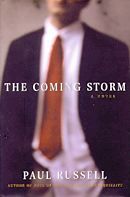|
|
||||||||
| Excerpts: | ||||||||
|
||||||||
| An Interview with the Author |

![]()


From Chapter 3
The Coming
Storm
By Paul Russell
[On a train to the Forge School, Tracy considers Noah and his role as a teacher.]
All the Metro North cars had names: John Cheever, Thomas E. Dewey, James Fenimore Cooper. Maria Mitchell, whoever she was. He boarded the Washington Irving.
Coming out of the long tunnel from Grand Central into the sun, he felt a pang of loss so keen it took him by surprise. Forget Tokyo. No matter how you felt about it, Manhattan was still the center of the world.
Around the edges, though, it was fraying. The train glided through a no-man's-land of looted automobiles, mounds of rubble, whole streets of abandoned buildings, their windows boarded over with sky-blue plywood. At the base of bleak apartment towers sycamores struggled in bare earth, their limbs draped in shredded plastic bags tossed from the stories above. And then in an asphalted lot, five shirtless Puerto Rican beauties were playing basketball in the mild October sun.
There was no denying it. Boys grabbed him. Their loveliness tore him apart. The world was a wonder after all.
For a while he tried to sleep, but that was no good. His brain seethed with the weekend's sensory overload: the spent condom lying on the floor next to Devin's bed the morning after, Arthur's cheerful enumeration of his various symptoms, the array of pills he was taking. In the seat behind him, a man and woman talked back and forth to one another with dull, mechanical constancy. Their voices weren't loud, but as if having haplessly discovered the frequency of their broadcast, Tracy couldn't seem to tune them out. He hated couples who'd been married so long their lives had settled into what amounted to little more than a stupor. Did anything mean half as much to them as a momentary glimpse of boys without shirts playing basketball meant to him? What would they make of his razor-sharp ecstasies -- or, for that matter, the terrible anxieties a twenty-five-year-old gay man these days had to fight down every minute of his existence? All the probabilities were that he'd be dead at half their age.
For a moment he was on the verge of remembering something important, but then the couple behind him resumed their dreary exchange of nothings, and the memory, whatever it had been, went behind a cloud. Desperate to sever himself from their voices, Tracy rummaged in his bag and pulled out A Separate Peace. He was surprised anybody still taught it, but there it was on the syllabus Louis had given him at the beginning of the term for English II. He could barely remember a thing about it. A prep-school kid with a crush on his best friend. Kind of suspicious, really. But it might prove interesting to teach -- the challenge being, of course, to get his students to think about all that without seeming to steer them too intently. Arthur had been at least partially right: the last thing Tracy wanted, at this early point before he'd sufficiently settled in, was for his class to be able to write their teacher off as a fag.
Thought maybe, he though, he should give them exactly that chance. Maybe it would do them some good. They were so terrified of being little faggots themselves that they were afraid even to touch one another for fear of their motives being mistaken. That was one of the things that had surprised him about the Forge. Told that he'd need to supervise some athletics, and remembering his own high school days, he'd looked forward to the innocent pleasure -- well, maybe not so innocent -- of the locker room, only to discover that virtually none of the boys would even set foot in there. After the period was over, they hightailed it back to the privacy of their dorm rooms to shower and change.
Suddenly the memory that had failed him earlier returned at full wattage. Funny what difficulties the mind, left to its own devices, could hedge on. For most of the weekend he'd managed to put Noah's so-called gift almost completely out of mind.
"Something to entertain you on the train," the boy had said, presenting him on his way out the door with what seemed to be a partial roll of toilet paper wrapped loosely around an unsharpened pencil whose eraser end was capped by a rubber jack-o'-lantern's head. "And Happy Halloween," he'd continued awkwardly.
Seeing there was writing on the toilet paper, Tracy had started to unroll it; but Noah grabbed his wrist. "It's for the train," he admonished with a nervous, inadvertent laugh. "No fair peeking."
He had an unhumorous way of smiling. His eyes would narrow to slits, the corners of his mouth pull back tensely. He looked more grim than amused, and it worried Tracy about him. He knew so little about this boy, his inadequacies, both academic and emotional, the various troubles that dogged him. What he did know, or at least had come, during the last month, to sense with some certainty, was that Noah represented a special kind of challenge. But the nature of that challenge, and whether he would prove at all adequate to it, completely eluded him. Certainly his Japanese students, those well-behaved and inviolable girls, all giggles and at the same time possessed of a really sublime earnestness, had been straightforward compared to this American boy who offered him toilet paper and a pencil.
He hadn't waited till the train. Deposited some half hour early by the taxi -- Louis had warned him they were highly unreliable -- he'd sat on a bench in the bleak Metro North waiting room and unscrolled his present. On the individual sheets of toilet paper, one sentence per sheet, Noah had written in felt-tipped pen that bled almost illegibly:
i wonder what he looks like when he's asleep
i wonder what he'd look like with a beard
i wonder if he likes it here
i wonder what he was like in high school
i wonder if he likes us
i wonder if he lets anybody get to him
i wonder if he ever gets depressed
i wonder what he'll be doing in ten years
i wonder what he thinks he's doing now
Following was a crude caricature of an alarmed face -- wide eyes, open mouth, hair on end -- along with the cryptic caption, as if he'd been reading ahead in his assignments (thought that seemed rather uncharacteristic of him):
help me finny I'm drowning
Out over the river, rippled, shale-gray clouds were moving in from the west. The surrounding hills grew somber, the waters darker. He would not think anymore about Noah. Though he had this sudden, distressing feeling. The word floated in his head: subcutaneous. It was so sudden, so unexpected. How had he let someone get under his skin like that? Devin had been almost too right: there was something moving about a fifteen-year-old boy. Not so much the individual boy himself, but rather some quality that attached itself to him, the simple fact of his youth, the territory he was passing through. Some light that shone about him that made him, for a moment, crazily special. How strange that you could fall so hard for that trick of light. And what, when you fell, did you want from it?
Idle thoughts. There wasn't anything he wanted from Noah, unless -- and this was the startling thought that occurred to him as he watched the sullen plain of the river out the window -- what he wanted was not to be seen through. He paused, testing that discovery, its plausibility. i wonder what he thinks he's doing now, Noah had written with sly aggression. Was it true that that was precisely what he feared, some threat by Noah to see through him? To catch him unawares at something he himself was too dense to see. To unnerve him. From the very first his casual glance had said, almost contemptuously, I know you. And he had been attracted to that. Yet what did it mean, to be known? And why on earth should he care?
Once, when he was in college, a boy had stopped him on a path and given him just such a look. He was only a kid, thirteen or fourteen, but Tracy, suddenly, was uncannily aware that sex, its hunger and lure, lay somewhere in that look. Unnerved, he'd hurried on, gaze averted but spookily certain that if he paused to glance back, that boy would be standing there looking after him. Safely in his dorm room, he'd flung himself on his bed and, in a fit of desperation, saying to himself, "You're crazy, you're crazy," even as his imagination spun thrillingly out of control, masturbated furiously.
Shifting uncomfortably in his train seat, he tried to concentrate on the landscape passing outside the window, the river's flat shallows where birds skimmed in the dimming light. Painters had sought these shores. On the wall of Louis's office hung a very minor production of the Hudson River School: a limpid twilight, oxcart fording a broad stream; the Catskills drowsing in the pearly distance.
Out in the river, an oddity caught his attention: a series of ramparts and crenellated turrets set on a small wooded island. He'd seen those ruins on the way down; they caught his imagination, an inexplicable romantic folly out there interrupting the ordinary run of scenery. Who had built it, and why? He'd craned his head to catch as much of it as he could before it passed by. And this time too: flitting past the train windows, in an instant it was gone. But it had broken, thankfully, his somber reverie. He reentered the droning frequency of the couple behind him.
"Somebody," the old lady was telling her husband, "really should get out there and tear that thing down. It's a terrible eyesore. And somebody might get hurt."
Copyright ©
1999 Paul Russell.
 Back
to the Stonewall Inn
Back
to the Stonewall Inn
